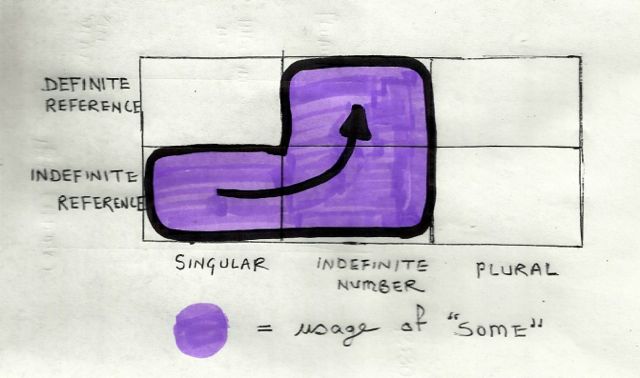Béu : Stuff discarded 3
Some original thought on "a" and "the"
..
Well the person you are talking to is the person you want to impart the message to (the second person), so basically whether you use "a" or "the" will dependent on the addressee's knowledge of the relevant NP. For example ...
..
| Relevant NP known to 2nd person | |
| I bought the car | 1 |
| I bought a car | 0 |
..
In the above table I am using terminology from the subject of logic ... 1 = yes, 0 = no, X = yes or no
..
So this is the BASIC difference between definite and indefinite.
..
In the above example (because of the "situation") we can also say ...
..
| Relevant NP known to 1st person | ... when 1st person means the speaker of course | |
| I bought the car | 1 | |
| I bought a car | 1* |
..
* Logic makes this a "1" ... not the grammar
..
We can combine the two tables above ...
..
| Relevant NP known to 2nd person | ... | Relevant NP known to 1st person | |
| I bought the car | 1 | 1 | |
| I bought a car | 0 | 1 |
..
Now lets change the "situation". We will change it as to its "reality" or 'realisation" ...
..
| Relevant NP known to 2nd person | ... | Relevant NP known to 1st person | |
| I want to buy the car | 1 | 1 | |
| I want to buy a car | 0 | X *** |
..
But as we said at the start, the reason for saying something is to make the hearer understand, so the X given to the speaker is perfectly logical.
..
***The question will be asked "how to make unambiguous the speakers knowledge of the NP". Some ways are shown in the table below ...
..
| Relevant NP known to 1st person | ... when 1st person means the speaker of course | |
| I want to buy a certain car | 1 | |
| I want to buy this car ... | 1 | |
| There's a/this car (that) I want to buy. | 1 | |
| I want to buy a car, any car ... | 0 |
..
Now lets introduce a 3rd person.
..
| Relevant NP known to 2nd person | Relevant NP known to 1st person | ||
| She married the American | 1 | 1 | |
| She married an American | 0 | X |
..
"She" of course being the 3rd person.
..
Now let's expand the above table a bit ...
..
| Relevant NP known to 2nd person | Relevant NP known to 1st person | Relevant NP known to 3rd person | |||
| She married the American | 1 | 1 | 1 * | ||
| She married an American | 0 | X | 1 * | ||
| She married some American | 0 | 0 ** | 1 * |
..
* Logic makes this a "1" ... not the grammar
** Actually many connotations about the speakers attitude when "some" is used. When said "tensely" shows disapproval. When said "whistfully" shows speakers unhappyness with his lack of knowledge about the American. This is the marked case of the indefinite so I guess many many (or any ?) unusual point of view on the speakers part will be coded by "some".
..
Now lets change the "situation". We will change it as to its "reality" or 'realisation" ...
..
| Relevant NP known to 2nd person | Relevant NP known to 1st person | Relevant NP known to 3rd person | |||
| She wants to marry the American | 1 | 1 | 1 | ||
| She wants to marry an American | 0 | X | X | ||
| She wants to marry some American | 0 | 0 | 1 |
..
So to summarise(and simplify) the above data, I would say ...
1) "the" or "a" chosen depending on whether the addressee (2nd person) knows the NP talked about
2) "some" is chosen over "a" to show that the NP is identifiable (but not necessarily by the 1st or 2nd person)
3) ... "some" also has picked up various connotations with regards to the 1st persons view of the NP under discussion.
A bit about "this" and "that"
The original meaning for these two, was when some object is unknown to the addressee but the speaker wants to make it known to the addressee. Typically he points (or gestures) to the object as he introduces it. He will qualify the object with "this" if it is near, and with the word "that" if it is not near.
Now in English, people have started using "this" when something is not in sight. It is used to indicate that the object is known to the speaker but not known to the addressee.
Probably the commonness of the above has prompted people to start saying "this here" instead of "this" by itself.
..
..... Index
- Introduction to Béu
- Béu : Chapter 1 : The Sounds
- Béu : Chapter 2 : The Noun
- Béu : Chapter 3 : The Verb
- Béu : Chapter 4 : Adjective
- Béu : Chapter 5 : Questions
- Béu : Chapter 6 : Derivations
- Béu : Chapter 7 : Way of Life 1
- Béu : Chapter 8 : Way of life 2
- Béu : Chapter 9 : Word Building
- Béu : Chapter 10 : Gerund Phrase
- Béu : Discarded Stuff
- A statistical explanation for the counter-factual/past-tense conflation in conditional sentences
